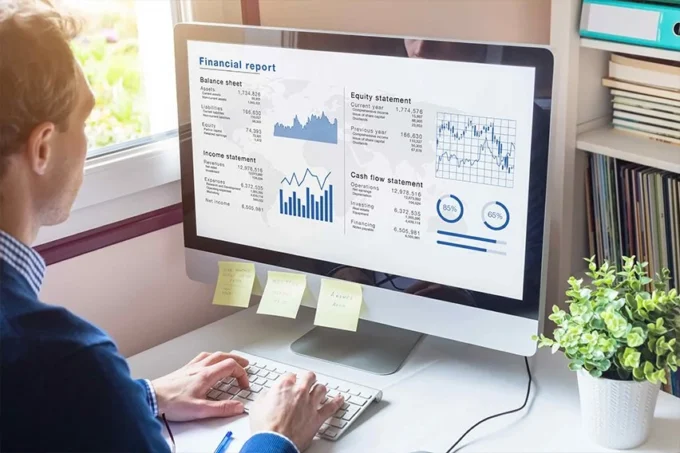Financial management has evolved significantly over the years, moving from manual bookkeeping to sophisticated digital solutions.
Prominent names, like Stefan Matthews, have worked in and talked about this subject for decades.
Today, the growing reliance on financial apps marks a new era, promising enhanced efficiency and convenience.
Evolution of Financial Management Software

Source: freshbooks.com
Financial management tools have come a long way from the days of manual ledgers and basic software programs. In the past, financial management primarily relied on human effort, involving time-consuming processes such as manual data entry and reconciliation.
With the advent of digital technology, financial management saw the introduction of software solutions that simplified tasks like accounting and payroll.
The rise of cloud-based solutions has revolutionized the industry. These platforms offer scalability, remote access, and real-time updates, making financial management more efficient and accessible.
Integration of Artificial Intelligence (AI) has further enhanced these systems, enabling predictive analytics, automated routine tasks, and improved decision-making processes.
AI-driven tools can analyze vast amounts of data to identify trends, detect anomalies, and provide insights, thereby reducing the burden on managers.
Automation has been a game-changer, especially for routine tasks such as bookkeeping, invoicing, and payroll management. Robotic Process Automation (RPA) has taken over repetitive tasks, minimizing errors and freeing up time for more strategic activities.
These advancements have made financial management more streamlined and less prone to human error, paving the way for more strategic and analytical roles within the finance sector.
Benefits and Advancements in Financial Apps

Source: mindinventory.com
The advent of financial apps has brought numerous benefits to individuals and businesses alike. One of the most significant advantages is convenience and accessibility.
Cloud-based solutions allow users to access their financial information from any device, anywhere in the world. This flexibility is particularly beneficial for businesses with remote workforces and for individuals who need to manage their finances on the go.
Efficiency and automation are other key benefits. Financial apps leverage AI and RPA to automate various financial processes, such as budgeting, expense tracking, and investment management.
This not only saves time but also reduces the likelihood of errors, ensuring more accurate records. These technologies enable advanced analytics and predictive modeling, allowing users to leverage data for risk management, forecasting, and strategic planning.
Blockchain technology is another advancement enhancing the security and cost-effectiveness of financial apps. Decentralized ledgers provide a secure and transparent way to record transactions, reducing the risk of fraud and ensuring data integrity.
Moreover, blockchain can streamline processes such as cross-border payments and smart contracts, making financial operations more efficient.
Overall, financial apps have made management more accessible, efficient, and secure. They provide users with powerful tools to manage their finances effectively, leveraging the latest technological advancements to deliver superior results.
Challenges and Limitations

Source: myjar.app
Despite the numerous benefits, there are challenges and limitations associated with apps. One major concern is the overreliance on technology, which can lead to potential issues with data security and privacy. Ensuring robust cybersecurity measures and staying updated with evolving regulations are crucial to mitigating these risks.
The effectiveness of budgeting apps is another challenge. While these apps offer tools to manage finances, their success heavily depends on user engagement and commitment. Many users struggle with maintaining regular check-ins and adjustments, leading to a lack of commitment and attention. Additionally, there can be a mismatch between the app’s methods and the user’s needs, making it difficult for the app to deliver the desired results.
Furthermore, financial apps often lack mechanisms for accountability and behavior change. Simply providing tools and insights is not enough to drive long-term behavior change. Users need to be motivated and held accountable to achieve their goals. This is an area where human intervention, such as financial coaching, can play a crucial role.
Regulatory compliance is another significant challenge. Financial apps must keep up with evolving regulations and ensure they are compliant with cybersecurity standards. Failure to do so can result in legal consequences and damage to the app’s reputation. Therefore, staying updated with regulatory changes and implementing necessary measures is essential for the success of financial apps.
Practical Tips for Effective Use of Financial Apps
To maximize the benefits of financial apps, it is important to choose the right app that matches your personal needs. Evaluate the features offered by different apps and select one that aligns with your goals and habits. This ensures that the app provides the tools and functionalities you need to manage your finances effectively.
Commitment to regular check-ins is crucial for effective management. Regularly monitoring and adjusting your budget helps you stay on track with your goals. Set reminders or schedule specific times to review your finances, update your budget, and track your progress. This habit helps you stay engaged and ensures that you are making informed financial decisions.
Understanding the limitations of apps is also important. Recognize that these apps are tools to assist you in managing your finances, but they cannot replace the need for disciplined behavior. Use the insights provided by the app to guide your decisions, but also rely on your judgment and knowledge. Consider seeking advice from professionals when needed.
Balancing technology with human insight is essential for achieving effective management. While financial apps offer powerful tools and automation, human insight adds a layer of strategic thinking and personalized advice. Combining the strengths of technology and human expertise can lead to better outcomes.
The Future Outlook

Source: internationalaccountingbulletin.com
The future of financial apps looks promising, with continuous innovation expected in financial technology and management. Emerging technologies such as AI, blockchain, and RPA will continue to evolve, offering more advanced features and capabilities. These advancements will further enhance the efficiency, security, and accuracy of apps.
However, it is important to balance technology with human insight. While technology can automate processes and provide data-driven insights, human expertise is needed for strategic decision-making and personalized advice. A balanced approach that leverages both technology and human insight will be key to effective management in the future.
Summary
Financial apps offer significant benefits, including convenience, efficiency, and security. However, they also come with challenges such as data security and the need for user commitment. By understanding these aspects and balancing technology with human insight, individuals can achieve effective financial management in a tech-driven world.







